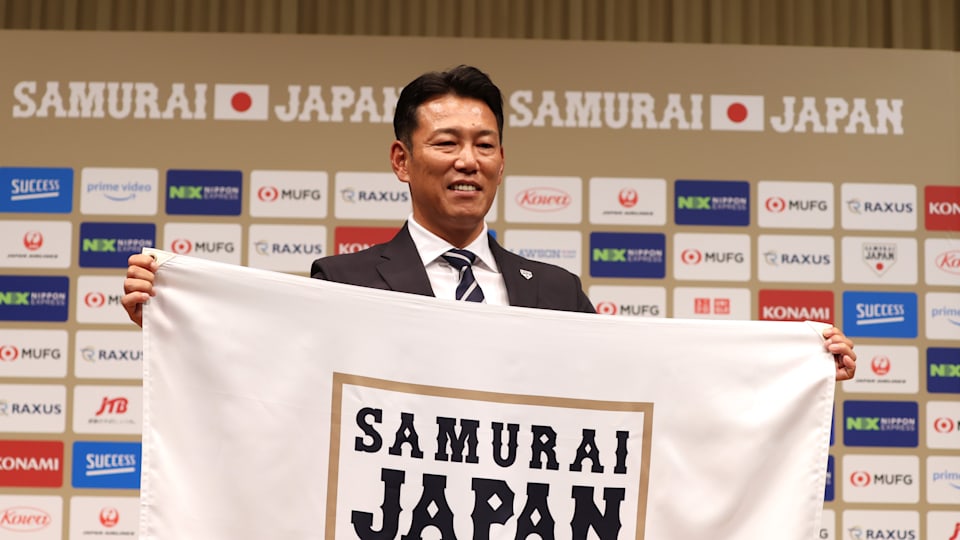Ibata Hirokazu: New Samurai Japan manager out to 'sow seeds' for Premier 12, 2026 World Baseball Classic, and LA 2028
The man in charge of the world and Olympic champions is on a daring mission to uncover new talent for the future while trying to win, and he knows it will not be easy.

Ibata Hirokazu has a tough job to say the least.
In October, the former All-Star, seven-time Gold Glove shortstop for the Chunichi Dragons succeeded Kuriyama Hideki, who managed Japan to the title at a drama-filled 2023 World Baseball Classic, which ended with Shohei Ohtani striking out his then team-mate Mike Trout.
As the manager of the reigning world and Olympic champions, Ibata faces the daunting task of recalibrating Samurai Japan for the Premier 12 this November, followed by the 2026 WBC and then Los Angeles 2028, where baseball-softball will rejoin the Olympic programme.
Ibata is expected not only to infuse new blood into the team but also to achieve success at the same time. He will be under intense scrutiny, and he knows it.
“It’s great when you’re winning but the thought of what happens when you lose is frightening,” Ibata told Olympics.com in an interview last month ahead of the Global Baseball Games against Team Europe on Wednesday and Thursday (6, 7 March) in Osaka.
“Having said that I don’t want to go on the defensive and play it safe. When you start going with the same players over and over, that signals the beginning of the end.
“I think we are capable of winning the Premier 12 with the players who are good now, but I need to pick players looking ahead to the next WBC, then the Olympics and the WBC after that. And if we don’t happen to win as we go through the process, I don’t mind taking the heat for it.”
Japan manager Ibata Hirokazu gets the celebratory toss after winning the Asia Professional Baseball Championship in November.
Ibata Hirokazu on Shohei Ohtani: 'He's just that phenomenal'
Ibata, 48, was renowned more for his fielding prowess than his batting skills, which sustained him throughout a 17-year career. He earned a Best Nine mention at the 2013 WBC, and helped Japan during the 2004 and 2008 Olympic qualifiers, although he never played at the Games themselves.
Ibata - who is also coach for Japan’s under-15s - admitted he never felt more pressure than he did during the Olympic qualifiers. As mainstream and as competitive as the WBC has become, he feels the Olympics are a tougher proposition because players from the majors have never been released for the Games.
And Ibata believes it is up to him to uncover the gems in Nippon Professional Baseball for the next cyclical future.
“I went through it for both Athens 2024 and Beijing 2008 but qualifying is tough. The burden of losing and not being able to compete at the Olympics is massive,” said Ibata, who shepherded Japan to the Asia Professional Baseball Championship in November, his first piece of silverware in charge of the national team.
“I was at the WBC where we lost in the semi-finals but it’s a different type of pressure in Olympic qualifying because if you don’t get through it, that’s the end of it. In terms of pressure, I think that was the most intense of my career.
“I’m not overly concerned with the WBC because the major league players will be there. The key is what you do afterwards. For the Olympics or the Olympic qualifiers when you’re not guaranteed of the major leaguers, you have to be able to put together a team from the domestic leagues.
“So for these upcoming games vs Europe and beyond, I want as many young players to have the opportunity to don the Japan uniform. Because once you wear it, it makes you want to keep wearing it - at the WBC or Olympics.
“I want to sow that seed.”
One Japan player who will not need added motivation for years to come is Ohtani, last year’s WBC MVP who signed with the Los Angeles Dodgers for a record 10-year, $700 million (USD) in the off-season.
Just like anyone and everyone who follows the game, Ibata marveled at what Ohtani has done and can still do as if he came from another world.
“Simply put, he is world class at both which is amazing because it’s not easy to do even one at that level. To be doing what he’s doing in the major leagues is incredible for sure but he has character on top of it. You run into people like that in little league all the time but it’s as if he made the direct jump from there to the majors.
“I’ve been wondering what it must feel like to be in Ohtani’s shoes. I think - and this is just a guess - it’s like a high school player playing against elementary school kids. It’s as if he was playing somewhere two leagues above the majors and came down to our level.
“I used to think who could do more than (Ichiro Suzuki) after what he did over there - and then comes along Ohtani. To outdo Ohtani you would have to not DH but play the field or catch when you’re not pitching. Or like win both the Cy Young and Hank Aaron Awards in the same season.
“He’s just that phenomenal.”
